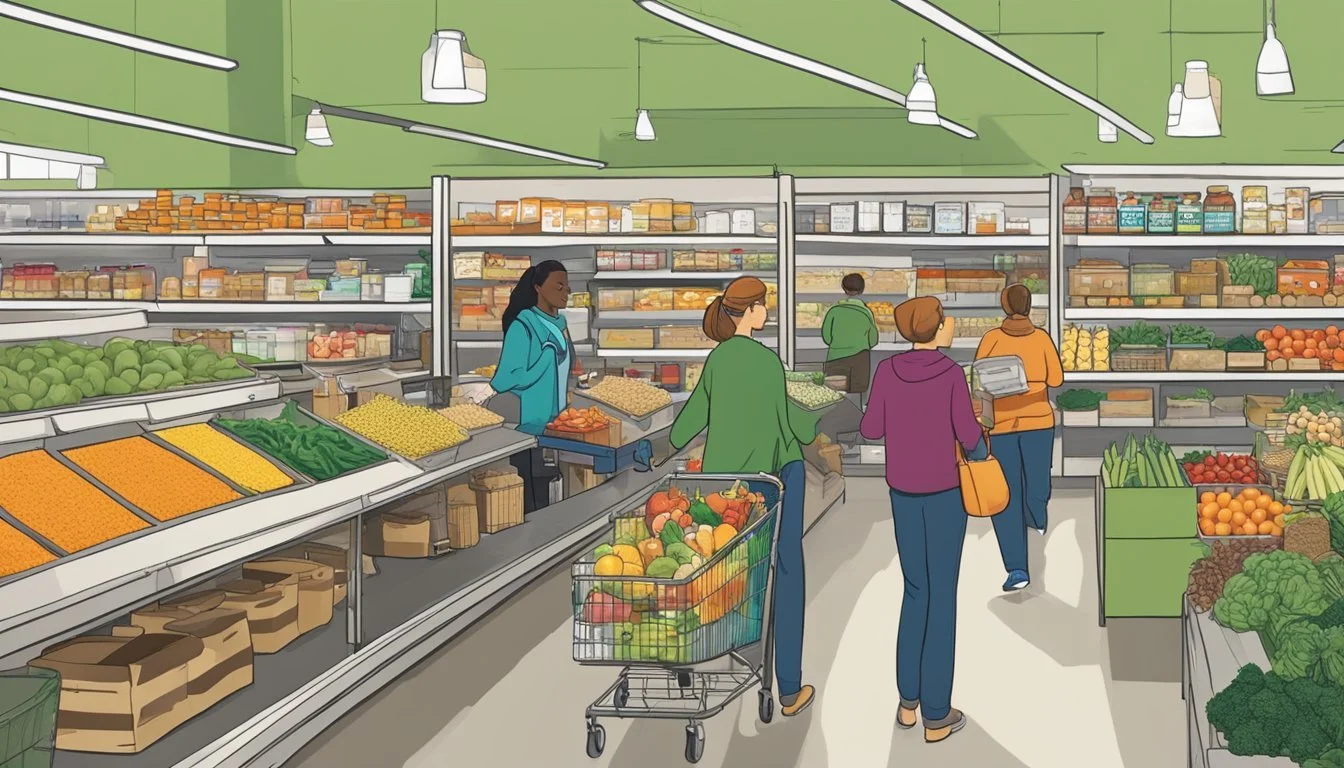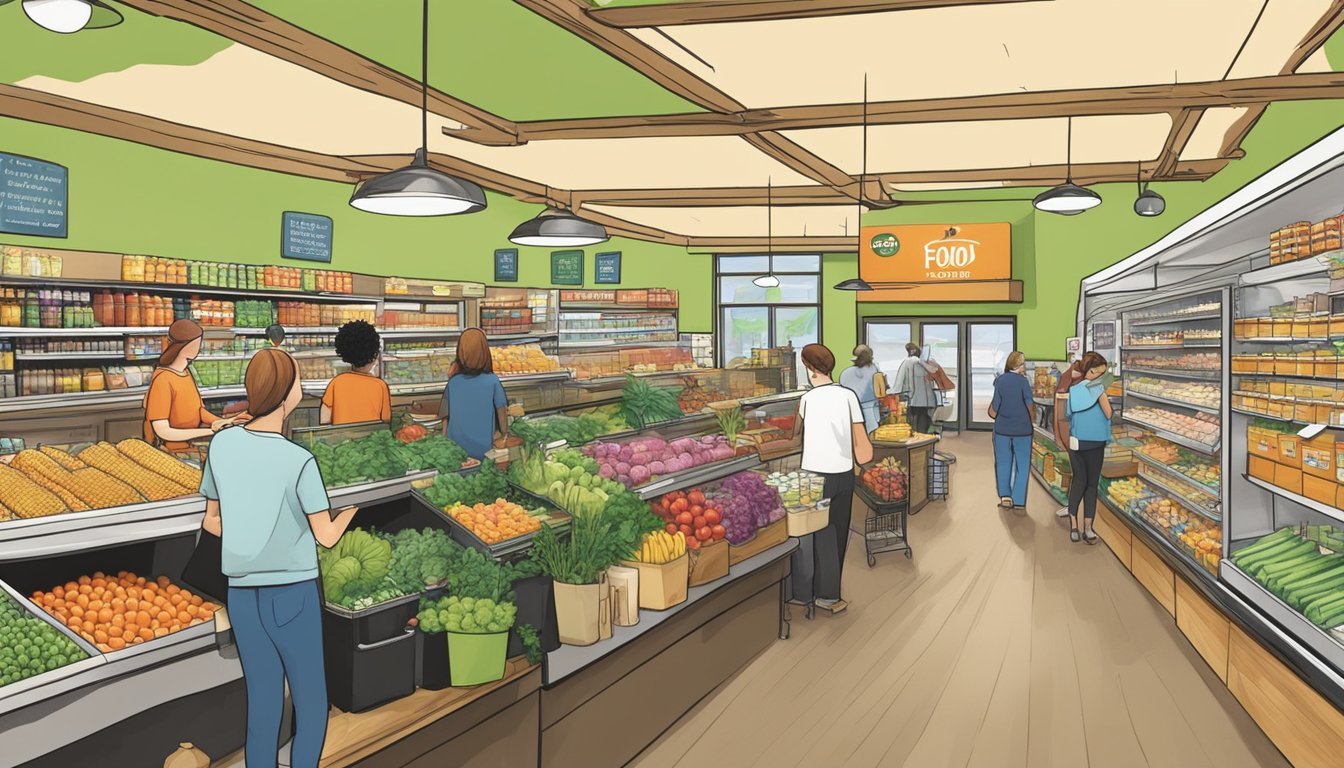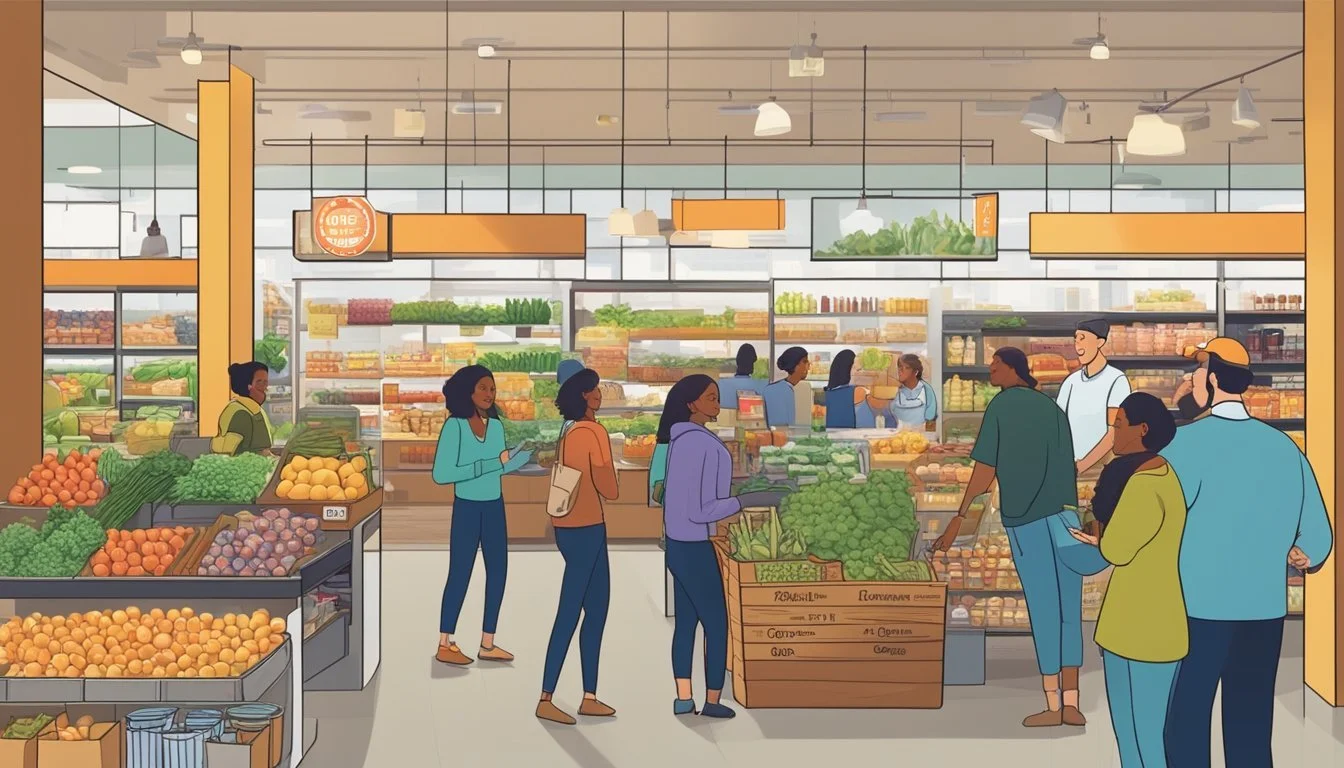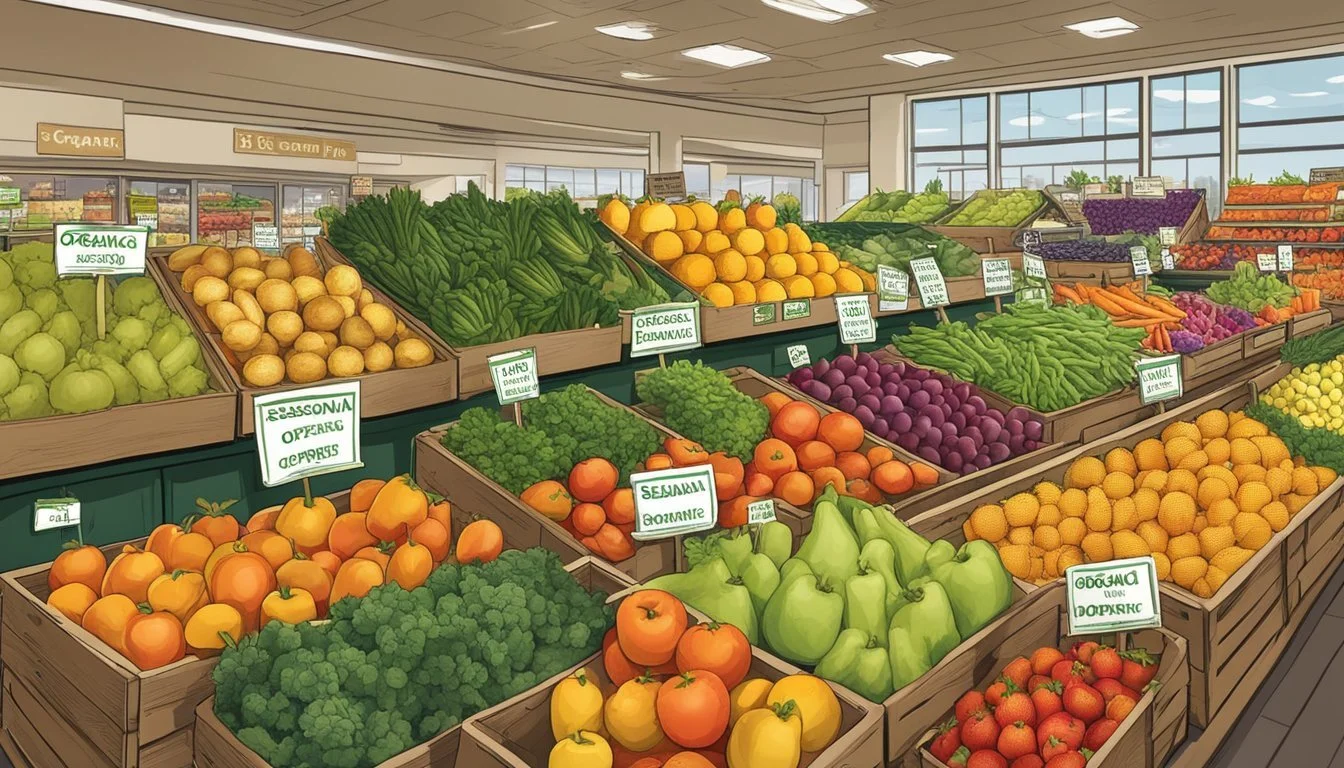Guide to Food Co-Ops in Minneapolis, MN
Your Essential Resource
Minneapolis, a vibrant city in Minnesota, has a strong sense of community that is vividly reflected in its numerous food co-ops. These co-ops thrive on the principles of community ownership, sustainability, and education. They are not just grocery stores but are places where the ideals of cooperation blend seamlessly with the practicalities of retailing. Providing a haven for consumers who value sustainable agricultural practices, healthy food options, and non-toxic household products, these co-ops are cornerstones of the local community.
In the Twin Cities area, food co-operatives stand as testaments to the region's commitment to ecological awareness and cooperative economics. They are democratically run by community members who take an active role in decision-making processes. These establishments are not merely shops but serve as educational platforms advocating for the benefits of organic farming and supporting local producers.
As consumers in Minneapolis seek more transparency and control over their food sources, the network of food co-ops in the area offers them the opportunity to engage directly with the supply chain. These stores promote a direct connection between the community and its food, allowing patrons not only to shop for their daily needs but also to become part of a movement that supports local economies and environmental stewardship.
History and Philosophy of Co-Ops
Food co-ops in Minneapolis are steeped in a rich tradition of community engagement and governed by a distinct set of cooperative principles that differentiate them from conventional supermarkets.
Origins of Food Co-Ops
The first food co-ops in Minneapolis appeared in the 1960s as a response to a growing demand for control over food sources and social change. This movement gained momentum and received ample support from various communities, fostering a network of co-operatives. By the 1970s, Minneapolis had become a notable center for food co-op development, with the establishment of numerous co-ops aligning with broader societal and counterculture movements.
Principles of Cooperation
Food co-ops in Minneapolis operate under cooperative principles that prioritize community ownership and democratic governance. These principles include:
Voluntary and Open Membership: Co-ops are open to all individuals willing to accept the responsibilities of membership, without gender, social, racial, political, or religious discrimination.
Democratic Member Control: Cooperatives are democratic organizations controlled by their members, who actively participate in setting policies and making decisions.
Member Economic Participation: Members contribute equitably to, and democratically control, the capital of the cooperative.
Autonomy and Independence: Co-ops are independent organizations controlled by their members.
Education, Training, and Information: Co-ops provide education and training for members to contribute effectively to the development of their co-ops.
Cooperation among Cooperatives: By working together through local, regional, national, and international structures, co-ops improve services, bolster local economies, and deal more effectively with social and community needs.
Concern for Community: Cooperatives work for sustainable development of their communities through policies approved by the members.
These principles ensure that the food co-ops in Minneapolis are centered around their members' needs and sustain a business model that promotes ethical economic development and social responsibility.
Benefits of Joining a Co-Op
Joining a food co-op offers tangible advantages for both the individual and the broader community. These benefits range from economic gains for members to fostering a spirit of community involvement.
Economic Advantages
Members of a food co-op often experience unique economic benefits. They are entitled to receive member-only discounts, which can lead to considerable savings over time. Additionally, they invest in equity within the cooperative, which means that they are part-owners of the enterprise. This can sometimes result in a return on investment during profitable periods.
Discounts: Members enjoy lower prices on various goods.
Financial Return: Depending on the co-op’s success, members may receive dividends.
Investing in the local economy is another significant economic advantage of co-op membership. By preferring local produce and products, food co-ops support local farmers and producers, which in turn maintains and strengthens the local economy.
Support Local Economy: Spending at co-ops helps keep money within the community.
Community Involvement
Co-ops thrive on the principle of community involvement. Members are encouraged to engage in volunteer labor, offering their time and skills to support the co-op's operations. This involvement not only builds a sense of ownership but also fosters a closer-knit community.
Volunteering: Opportunities to contribute to the co-op's activities.
Community Building: Strengthen bonds with neighbors and local businesses.
Beyond volunteer opportunities, co-op membership also entails a say in the governance of the cooperative. Members can vote on important decisions and often have the opportunity to serve on the co-op's board of directors.
Decision-Making: Members vote on significant issues affecting the co-op.
Leadership Opportunities: Members can run for and serve on the board.
Types of Co-Ops in Minneapolis
Minneapolis is home to a diverse array of cooperative enterprises that cater to the community's needs. These member-owned entities emphasize local control and mutual benefit.
Grocery and Retail Co-Ops
Grocery and retail co-ops are cornerstone establishments in the Twin Cities metro area. They are collectively owned by their members, who typically pay a membership fee to vote on governance decisions and receive dividends. These co-ops sell a range of products, often focusing on local, organic, and sustainably-sourced goods.
Seward Co-op: Emphasizes fair trade and organic products.
Eastside Food Cooperative: Known for its wide selection of local produce.
These co-ops not only serve as grocery stores but also act as community hubs, hosting events and educational opportunities.
Buying Clubs
Buying clubs are another integral part of the cooperative scene. Unlike storefront co-ops, these organizations operate by pooling members' resources to buy goods in bulk. This model allows members to access lower prices. The buying clubs are not necessarily bound to a physical location and might distribute products via deliveries or member pick-ups.
Twin Cities Food Buying Club: A prominent example that operates on a large scale, pooling member resources for better prices on produce and grocery items.
The existence of both grocery and retail co-ops alongside buying clubs reflects a vibrant cooperative ecosystem in Minneapolis, offering consumers various ways to shop for food and goods while investing in their local economy.
Understanding Co-Op Membership
Cooperative grocery stores in Minneapolis operate on a model of member-ownership, meaning that they are owned and democratically controlled by the consumers who shop there. Membership provides a host of benefits, from a say in the business's operations to financial advantages.
Member-Ownership
When an individual decides to become a member-owner of a food co-op, they are purchasing an equity share in the business. This share represents a financial investment that supports the co-op's sustainability and growth. Member-owners have a voice in major decisions typically through a vote—for instance, in board elections or significant policy changes. This democratic approach allows members to directly influence the co-op's offerings, ensuring a selection that aligns with their tastes and values.
Membership Benefits
The benefits of becoming a member of a Minneapolis food co-op often extend beyond simply having a say in the business. Members frequently enjoy:
Economic perks: Exclusive discounts on products, special deals, or yearly dividends based on the co-op's profitability.
A diverse selection: Access to a range of high-quality, locally-sourced, and ethically-produced goods tailored to the community's preferences.
Enhanced taste experience: An emphasis on fresh, organic, and artisanal products contributes to a richer and more satisfying taste experience.
Community connection: Opportunities to engage in educational events, workshops, and community-building activities.
By becoming a part of a food co-op, members invest in a model that prioritizes collective benefit and personal well-being through their grocery choices.
Local Producers and Suppliers
Minneapolis food co-ops prioritize connections with local farmers and suppliers to offer consumers fresh, sustainable options. By focusing on local partnerships and economic support, these co-ops champion regional agriculture and contribute to a robust local food system.
Local Farming Partnerships
Food co-ops in Minneapolis foster strong relationships with local producers, ensuring that shoppers have access to high-quality, locally grown produce. The Good Earth Food Co-op, for example, categorizes "local" as products from Minnesota and neighboring states like Wisconsin and Iowa. These products are required to be clearly labeled with the state, town, and farm of origin. Lakewinds Food Co-op collaborates with over 350 local farmers and producers, exhibiting their dedication to local partnerships and community sustainability.
Support for Local Economy
By sourcing from local suppliers, food co-ops in Minneapolis not only provide fresh products but also bolster the local economy. They support small-scale farmers and producers, which helps to maintain the economic vitality of the regional agriculture sector. Certified organic items, available at many of these co-ops, come from a variety of local food categories, including fresh produce, meats, dairy products, and poultry, emphasizing their commitment to quality and local economic health.
Seasonal and Organic Offerings
Minneapolis food co-ops prioritize access to organic food options and embrace the varied seasonality of produce. They are dedicated to providing consumers with a selection of fresh and organic groceries that reflect the seasons and support sustainable agriculture.
Organic Foods Availability
Food co-ops in the Twin Cities, such as the Seward Community Co-op and Eastside Food Co-op, offer a diverse range of organic foods. Shoppers can find everything from certified organic produce to naturally raised meats and dairy. These co-ops ensure that health and environmentally conscious consumers have access to consistent, high-quality organic options all year round.
Fresh Produce: A variety of fruits and vegetables certified organic.
Meats: Naturally raised, without the use of antibiotics or hormones.
Dairy Products: Organic milk, cheese, and eggs sourced from local farms.
Seasonality of Produce
The seasonality of produce is reflected in the offerings at local food co-ops. As seasons change, so does the availability of certain fruits and vegetables. Co-ops, such as those located in the heart of Northeast Minneapolis, focus on connecting consumers with the freshest seasonal produce.
Spring: Expect tender greens, asparagus, and strawberries.
Summer: A bounty of tomatoes, berries, and sweet corn.
Fall: Root vegetables, squash, and apples abound.
Winter: Stored root crops and hearty winter greens are typical finds.
By aligning their offerings with the growing seasons, Minneapolis food co-ops provide not only fresh and flavorful produce but also support for local farmers who practice sustainable agriculture.
Special Dietary Options
Food co-ops in Minneapolis provide an inclusive selection that caters to various dietary preferences and needs. Consumers can find ample choices for plant-based diets as well as products specifically tailored for those with gluten sensitivities or allergies.
Vegan and Vegetarian Offerings
Minneapolis food co-ops boast a diverse and rich variety of vegan and vegetarian products. Shoppers can find everything from fresh produce to meat substitutes, and dairy-free alternatives. There is a strong focus on providing organic options, ensuring that the selection is not only extensive but also of high quality. The co-ops often source from local producers, bolstering community-supported agriculture and reducing food miles.
Produce: Organic fruits and vegetables.
Meat Substitutes: Plant-based burgers, sausages, and cold cuts.
Dairy-Free Alternatives: Cheese, milk, and yogurt options made from nuts and other plant sources.
Gluten-Free and Allergy-Conscious Products
Individuals with gluten intolerance or other dietary restrictions will find that Minneapolis co-ops are well-stocked with suitable options. These establishments provide clear product information and education to ensure consumers can make informed choices. The shelves are lined with gluten-free staples such as pasta, breads, and baking ingredients, as well as a selection of other allergy-conscious products designed to meet consumer’s special dietary requirements.
Gluten-Free Goods: Pasta, breads, cereals, and snacks.
Allergen-Free Items: Products free from common allergens such as nuts, dairy, and soy.
Community and Educational Outreach
Minneapolis has a strong tradition of community engagement through its food co-ops. Education and local involvement are at the heart of these initiatives.
Classes and Workshops
Midwest Food Connection offers a wide range of educational opportunities. They provide classes that focus on teaching about local, healthy foods. The curriculum often includes lessons on nutrition, the environment, and how to incorporate more wholesome ingredients into everyday meals. Workshops take place in various settings, including schools and co-op spaces, facilitating learning for all age groups within the community.
Community Events
Community events are a staple of Minneapolis food co-ops. These co-ops frequently organize gatherings that may include local food sampling, cooking demonstrations, and discussions on food-related subjects. These events serve as platforms for residents to connect and learn about sustainable practices, food justice, and how to support local farmers and producers. Through these community events, co-ops strengthen relationships and foster an inclusive environment for all members of the community.
In-Store Features
Food co-ops in Minneapolis are not just places to buy groceries; they offer a range of in-store features that cater to the conscious consumer seeking convenience and eco-friendly options.
Delis and Prepared Foods
Minneapolis food co-ops offer an array of delis and prepared food sections designed to provide fresh and nutritious meal options. Wedge Lyndale, for instance, is renowned for its Made-to-order Counter which operates from 11 a.m. to 8 p.m. daily. Their hot bar also runs during the same hours, serving a selection of ready-to-eat hot meals. In these delis, customers can find a variety of options, from quick snacks to full-course meals, accommodating busy lifestyles while promoting healthy eating.
Bulk Foods and Sustainable Packaging
A significant advantage of shopping at food co-ops is the access to bulk foods, which allows customers to purchase the exact amounts they need, reducing food waste and unnecessary packaging. Shoppers have the opportunity to buy a variety of goods like grains, nuts, spices, and more without the constraint of pre-packaged sizes. Additionally, these co-ops champion sustainable packaging practices. Patrons are encouraged to bring their reusable containers, supporting the eco-friendly ethos of reducing single-use plastics, thus contributing to a healthier environment.
Additional Services and Amenities
Food co-ops in Minneapolis don't just offer a range of natural and organic foods; they also provide a host of services catering to the community's needs.
Special Orders and Local Delivery
Food co-ops often accommodate special orders to help customers purchase items in bulk or obtain hard-to-find products. Moreover, several co-ops support local delivery services, ensuring that even those unable to visit in person can enjoy their offerings.
Special Orders:
Bulk purchases
Access to rare or unique items
Local Delivery:
Home delivery options
Partnering with local services for wider reach
Equipment and Kitchen Rental
Some Minneapolis food co-ops extend their community support by offering equipment rental and kitchen space for members and non-members alike. Whether one needs a larger space for food preparation or specialized equipment, these services can be invaluable for local food entrepreneurs and community events.
Equipment Rental:
Availability of specialty kitchen tools
Rental options for members and non-members
Kitchen Rental:
Commercial-grade kitchen facilities for rent
Space for food preparation and educational classes
Finding the Right Co-Op for You
When selecting a food co-op in Minneapolis, MN, shoppers should consider two primary aspects: the co-op's location/accessibility and the variety and pricing of products offered.
Co-Op Location and Accessibility
Minneapolis residents have several co-op options, each situated in distinctive neighborhoods. Seward Community Co-op and Eastside Food Co-op are well-known for being easily accessible to local residents. Proximity to home or work can significantly reduce travel time and supports frequent shopping for fresh produce. One should also evaluate:
Parking availability: Is there ample parking space?
Public transport links: Are there convenient bus or train routes?
Bike accessibility: Are bike racks available for those who prefer to cycle?
Product Selection and Pricing
The selection of products at Minneapolis co-ops typically includes local, organic, and sustainable goods. Shoppers can find fresh, high-quality produce along with a variety of health-conscious and ethical products. Co-ops like the Wedge Community Co-op offer a broad range of goods from local growers and suppliers. When assessing product selection and pricing, shoppers should note:
Organic and local produce: Is there a focus on locally sourced, organic products?
Special dietary options: Are there sufficient choices for those with dietary restrictions, such as gluten-free or vegan items?
Competitive pricing: How do the prices compare with other local retailers?
Both product selection and pricing are key factors that reflect a co-op's commitment to its community and environment, placing importance on health, sustainability, and ethics.
Co-Ops and the Twin Cities Community
Food co-ops in the Twin Cities not only offer a unique shopping experience but also play a significant role in bolstering the local economy and fostering business collaborations.
Impact on Local Economy
Food co-ops in Minneapolis are cornerstone institutions in the local economy, supporting sustainability and economic growth. They often source products from area farmers and producers, directly impacting the local agriculture and small business sectors.
Economic Contributions:
Job Creation: By providing employment opportunities, co-ops contribute to economic vitality.
Local Investment: Dollars spent at co-ops stay within the community, amplifying their economic impact.
Collaboration with Twin Cities Businesses
The co-ops' deep ties with Twin Cities businesses go beyond transactions; they often engage in partnerships that promote community development and sustainable practices.
Partnership Highlights:
Mutual Support: Co-ops collaborate with local food producers, health and wellness businesses, and educational initiatives.
Community Events: They frequently host events that bring local vendors and residents together, strengthening community bonds.
By integrating closely with the local economy and other businesses, co-ops in the Twin Cities exemplify how commerce and community can thrive together.
Famous Minneapolis Co-Ops
Minneapolis is well-known for its strong cooperative culture, with several co-ops that have established themselves as key players in the local food scene. They not only offer fresh, organic produce but also champion community engagement and sustainable practices.
Seward Co-Op and Linden Hills Co-Op
Seward Co-Op has a longstanding history in Minneapolis, seen as a pioneer in community-owned natural foods. It started in 1972 and has since grown to include two locations: the Franklin store and the Friendship store. Seward focuses on local, organic products and is recognized for its contribution to community equity and positive environmental practices.
Linden Hills Co-Op, established in 1976, reinforces similar values, prioritizing organic, locally sourced goods, and strong community relations. It's situated in a neighborhood that values environmental sustainability and healthy lifestyles, which reflects in the products and services it offers.
The Wedge and Eastside Co-Op
The Wedge Community Co-Op opened its doors in 1974 and has become a well-respected institution in the Minneapolis co-op scene. The Wedge is known for its extensive selection of organic produce, sustainable meats, and artisanal cheeses. They have a commitment to supporting local farmers and producers, which resonates throughout their store.
Eastside Co-Op complements the vibrant cooperative landscape with its own unique strengths. Established in Northeast Minneapolis in 2003, Eastside offers a range of natural and organic foods with a focus on fair trade and locally produced items. This co-op is also actively engaged in community development and eco-friendly initiatives.












